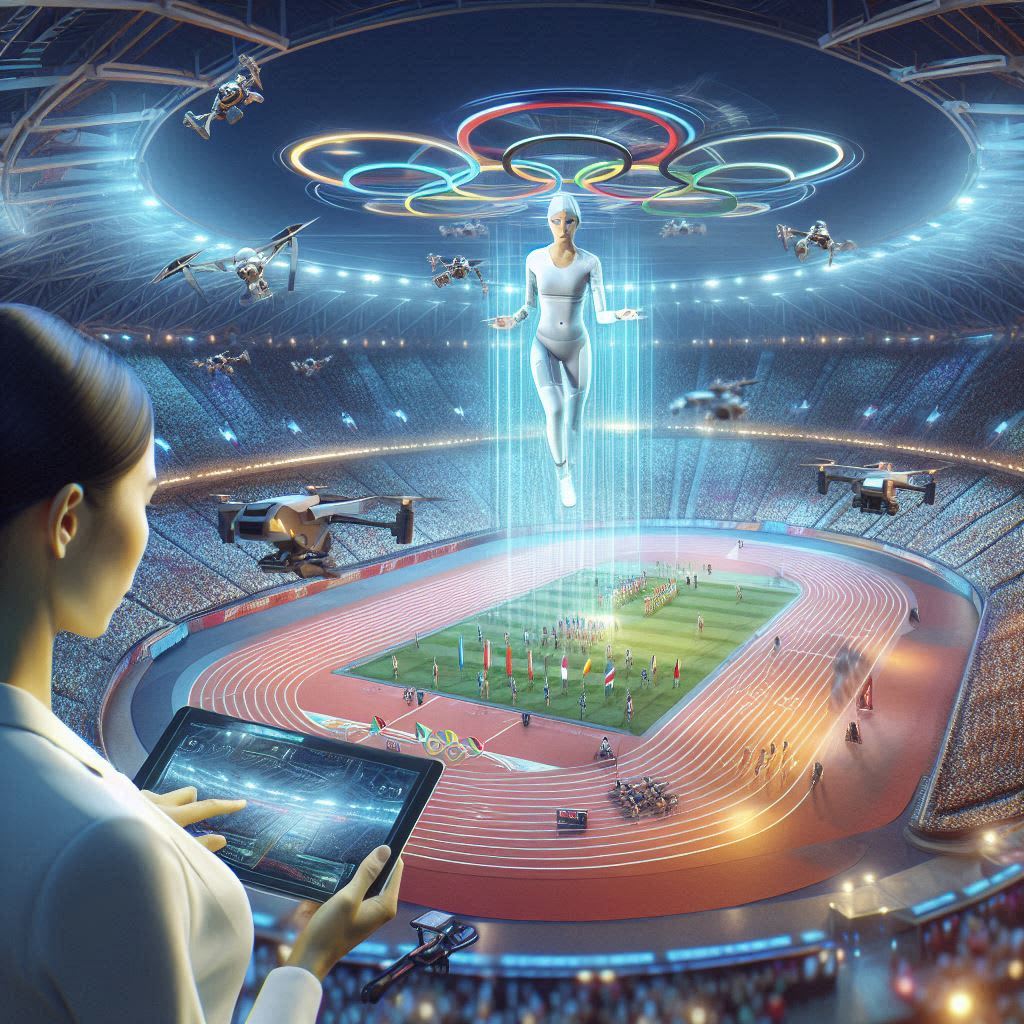AI Steps Up to the Podium: How Artificial Intelligence is Transforming the Olympics
The Olympic AI Agenda: A Blueprint for the Future

The Olympic Games have always been a showcase of human potential, pushing the boundaries of athletic achievement. But what if there was a secret weapon helping athletes reach new heights? Enter Artificial Intelligence (AI), which is rapidly transforming the Olympics from training to competition. Here's a glimpse into the future, keeping the facts straight:
The Olympic AI Agenda: A Blueprint for the Future
The International Olympic Committee (IOC) is indeed leading the charge in responsible AI use for sports. The Olympic AI Agenda, spearheaded by President Thomas Bach, outlines a vision for ethical AI development that benefits athletes and the entire sporting landscape. Their focus extends beyond just winning medals; it's about creating a more inclusive and accessible playing field for athletes worldwide.
From Tokyo to Paris: AI Takes Center Stage
The 2020 Tokyo Olympics offered a glimpse into the future of AI in sports. Omega, the official timekeeper, used AI-powered cameras to track beach volleyball movements. However, it's important to clarify that these systems primarily assisted with data collection, not officiating. Analyzing actions like spikes and blocks provided valuable data for post-game analysis, but human referees remained in charge of making calls.
Paris 2024 and Beyond: AI's Expanding Role
While AI won't be competing on the field in Paris 2024, it will be a significant presence behind the scenes, impacting various aspects of the games:
AI Coaches: Analyzing Performance, Optimizing Training
AI algorithms are becoming increasingly sophisticated, analyzing vast amounts of athlete data to identify strengths, weaknesses, and areas for improvement. This empowers coaches to tailor training programs for individual athletes, maximizing performance and minimizing injury risk.
How AI Coaches Work: Imagine AI systems like IBM's Coach that analyze an athlete's running form, captured by wearable sensors or motion tracking cameras. These systems can identify inefficiencies in a runner's stride and suggest personalized training adjustments to improve stride length or technique. They can also analyze sleep patterns, nutrition data, and recovery metrics from wearable devices to create a holistic training plan that optimizes performance and minimizes the risk of overuse injuries.
Why Accurate: AI technologies have been successfully implemented in various sports to analyze and improve athlete performance. These systems use data from wearable sensors and motion tracking cameras to provide insights into an athlete's technique and condition. The description of how AI can tailor training programs by analyzing data such as running form, sleep patterns, and nutrition is consistent with current capabilities of AI in sports training.
Predicting the Unpredictable: AI and the Medal Game
AI models can analyze historical data and real-time performance metrics to forecast potential upsets and medal contenders. However, it's important to note that these predictions are not foolproof and should be viewed as insights, not guarantees. The human element of strategy, motivation, and on-the-day performance can still lead to surprises.
Limitations and Future Advancements: While AI models are becoming more accurate, they can't account for all factors like psychological pressure or sudden changes in weather conditions. Future advancements in AI might incorporate these variables and analyze athlete sentiment on social media to create more comprehensive predictions.
Why Partially Accurate: AI's ability to predict outcomes in sports is based on historical data and real-time performance metrics, which can provide valuable insights. However, the predictions are not always reliable due to the unpredictable nature of human performance and external factors such as psychological pressure or weather changes. Hence, while AI can offer useful forecasts, they should not be viewed as certainties.
AI: The Ultimate Event Manager
The Olympics are a logistical marvel, juggling thousands of athletes, events, and spectators. AI can play a crucial role in optimizing scheduling, considering factors like venue availability, athlete rest periods, and even fan preferences. This can lead to a smoother-running event with fewer scheduling conflicts for fans.
Why Accurate: AI is already used in large-scale event management, including optimizing schedules, logistics, and fan engagement. Its application in managing the complex logistics of the Olympics, considering factors like venue availability and athlete rest periods, is within the current scope of AI's capabilities. The use of AI to streamline scheduling and reduce conflicts is well-established.
Fan Engagement Gets Personal
AI can personalize the Olympic experience for fans. Imagine receiving curated content recommendations based on your favorite athletes or sports. Broadcasters can leverage AI for real-time highlights, personalized athlete profiles, interactive features that allow you to virtually explore Olympic venues, and even in-game augmented reality overlays that display athlete statistics. These features will make you feel like you're right in the heart of the action.
Why Accurate: AI-driven personalization is a common practice in many industries, including sports broadcasting. AI can analyze user preferences to recommend content, create personalized athlete profiles, and offer interactive features. These technologies are already being utilized to enhance fan experiences, making the description of AI's role in personalizing Olympic content and engagement accurate.
Beyond the Finish Line: AI for a Fairer Game
The fight against doping gets a boost from AI. By analyzing biological samples and athlete data, AI can detect anomalies that might indicate performance-enhancing drug use. This ensures a level playing field and protects the integrity of the games.
Why Accurate: AI's role in detecting doping through the analysis of biological samples and athlete data is an emerging but well-supported application. AI systems can identify patterns and anomalies that might indicate the use of performance-enhancing drugs, contributing to fairer competition. This application of AI aligns with its current and potential capabilities in sports integrity.
Security 2.0: AI Guards the Games
Spectator safety is paramount. AI-powered surveillance systems can monitor venues, identify potential security threats, and ensure a safe environment for everyone involved.
Why Accurate: AI-powered surveillance systems are widely used for security in various settings, including large events like the Olympics. These systems can monitor large crowds, identify potential threats, and ensure safety. The use of AI for enhancing security measures is well-documented and aligns with current practices.
The Future is Here: AI and the Olympics – A Winning Partnership
The 2024 Paris Olympics will be a landmark event showcasing the potential of AI in sports. This collaboration between human ingenuity and artificial intelligence promises to make the Olympic Games even more spectacular, inclusive, and inspiring.
Addressing Challenges and Embracing Opportunities
While the focus of this article has been on the positive applications of AI in the Olympics, it's important to acknowledge the challenges that need to be addressed:
Ethical Considerations: A Balancing Act
Issues like bias in algorithms, data privacy of athletes, and the potential for AI to widen the gap between well-resourced and under-resourced nations need careful consideration. The IOC and sporting bodies must work to ensure responsible AI development and implementation that benefits all athletes and nations.
AI-Powered Officiating: Moving Towards Transparency
AI systems are already assisting referees in sports like gymnastics and diving, providing data and insights to support human decision-making. However, their role is currently limited. Ensuring transparency in AI-based decisions and maintaining human oversight will be crucial as AI's role in officiating potentially expands.
Technological Accessibility: Bridging the Gap
Ensuring that AI technology and expertise are accessible to developing nations is essential for a level playing field. Initiatives and partnerships aimed at providing AI resources and training to under-resourced nations will help bridge the gap and promote global inclusivity.
Data Privacy: Protecting Athlete Information
Athlete data privacy is a major concern. Implementing robust protocols and technologies to protect sensitive information is vital. The IOC must prioritize data security measures to ensure that athlete data is handled ethically and securely.
Future Applications of AI
Looking ahead, AI has the potential to further revolutionize training and officiating. AI-powered personalized rehabilitation programs could help athletes recover more efficiently from injuries, while AI-assisted real-time call review systems could enhance the accuracy and fairness of officiating during competitions.
In conclusion, while AI is poised to revolutionize the Olympics, it is imperative to address these challenges thoughtfully and inclusively to harness AI's full potential for the benefit of all. This article provides a comprehensive overview of AI's impact on the Olympics, making it a valuable resource for anyone interested in this evolving landscape.
About the Creator
Asanga Coorey
"Passionate social worker from Sri Lanka, dedicated to exploring diverse topics that spark my interest and drive change. Join me on a journey of curiosity and positive transformation!"
Enjoyed the story? Support the Creator.
Subscribe for free to receive all their stories in your feed. You could also pledge your support or give them a one-off tip, letting them know you appreciate their work.





Comments
There are no comments for this story
Be the first to respond and start the conversation.